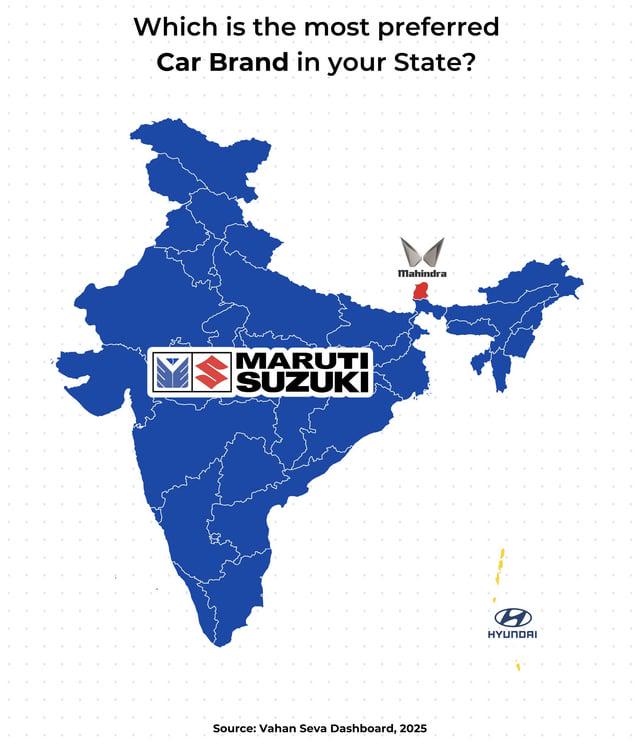Preferred Car Brand by State in India Map


Alex Cartwright
Senior Cartographer & GIS Specialist
Alex Cartwright is a renowned cartographer and geographic information systems specialist with over 15 years of experience in spatial analysis and data...
Geographic Analysis
What This Map Shows
This map displays the preferred car brand in each Indian state and union territory, highlighting the diverse automotive preferences across the country. With a rich tapestry of cultures, climates, and economies, India showcases a unique affinity for certain car manufacturers, reflecting not only consumer preferences but also regional economic conditions, infrastructure, and lifestyle choices.
Deep Dive into Car Preferences in India
When we explore the automotive landscape of India, one brand stands out prominently: Maruti Suzuki. As the largest car manufacturer in the country, Maruti Suzuki enjoys a significant market share, thanks to its affordability, reliability, and extensive service network. Interestingly, this brand is particularly favored in states like Maharashtra and Gujarat, where urbanization and middle-class growth have accelerated car ownership.
On the other hand, Mahindra, an Indian SUV maker, has carved its niche, especially in regions with rugged terrains and a preference for sturdy vehicles. States like Himachal Pradesh and Uttarakhand reflect this trend, where Mahindra's SUVs are often the vehicle of choice due to their robustness and off-road capabilities. This choice aligns with the lifestyle and needs of residents living in hilly areas, where reliable vehicles are essential.
It's also worth noting the presence of luxury brands in urban centers. For instance, in metropolitan hubs such as Delhi and Mumbai, brands like BMW and Audi are gaining traction among the affluent population. This shift indicates a growing disposable income and a desire for premium experiences among urban dwellers. Furthermore, the rise of electric vehicles (EVs) is shaping preferences, with brands like Tata and MG Motors making significant inroads, especially in progressive states like Karnataka and Maharashtra.
What’s fascinating is how car preferences can also reflect broader societal trends, such as the emphasis on sustainability. As environmental awareness increases, many consumers are gravitating towards eco-friendly vehicles, a trend that is expected to grow in the coming years.
Regional Analysis
Diving deeper into regional analyses, we can see stark contrasts in car preferences. In the northern states, for instance, there's a notable inclination towards SUVs and larger vehicles, largely driven by geography and family size. This is evident in states like Punjab, where Mahindra dominates the market due to its reputation for durability and spaciousness, catering to the needs of larger families and rural transport.
Conversely, in southern states like Tamil Nadu and Kerala, smaller, fuel-efficient cars from Maruti Suzuki and Hyundai are preferred, reflecting urban density and economic considerations. The compact size of these vehicles suits the congested roads of urban areas, where maneuverability is a priority.
Interestingly, the Northeast region showcases a different pattern altogether. The rugged terrain and unique cultural preferences lead to a higher demand for vehicles suitable for off-roading, thus favoring brands like Tata and Mahindra. The varied topography and remote areas necessitate vehicles that can withstand more challenging conditions, making sturdy SUVs more appealing.
Additionally, the union territories present unique preferences. For example, in Lakshadweep, the limited infrastructure and smaller population result in different automotive needs compared to mainland states. Here, smaller vehicles are often favored for their practicality in navigating the islands' narrow roads.
Significance and Impact
Understanding the preferred car brands across India is more than just a matter of consumer choice; it reflects economic trends, cultural nuances, and the evolving landscape of the Indian automotive market. As urbanization continues to rise, so too does the need for transportation solutions that cater to diverse populations.
Moreover, the implications of these preferences extend to manufacturing, marketing strategies, and even environmental policies. As we see a shift towards electric vehicles, manufacturers must adapt to these changing dynamics to meet consumer demands. This transition is not only crucial for business sustainability but also pivotal in addressing climate change concerns in a rapidly urbanizing country.
Looking ahead, the automotive industry in India will likely continue evolving, with growing emphasis on sustainability and technology integration. As electric and hybrid vehicles become more mainstream, it will be intriguing to see how consumer preferences shift in the coming years. Will we see a complete overhaul in what brands dominate the market, or will traditional favorites remain steadfast? Only time will tell, but one thing is clear: the map of car preferences is a reflection of the broader socio-economic landscape of India, making it a fascinating area of study for geography enthusiasts and industry analysts alike.
Visualization Details
- Published
- August 31, 2025
- Views
- 100
Comments
Loading comments...